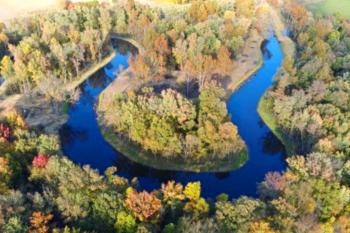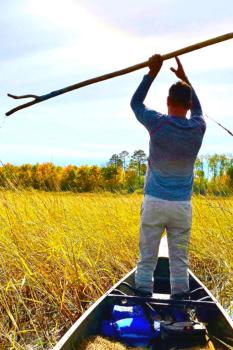The Great Lakes Basin includes the ancestral, traditional and contemporary lands and waters of many Indigenous peoples. Reservations and off-reservation land in which Tribes and Indian Nations retain rights comprise millions of acres within the basin. As original caretakers of the waters and lands within the basin and as holders of continuing legal rights to use those waters and lands, Tribes and Indian Nations continue to lead in the stewardship of the Great Lakes and their associated ecosystems, preserving and protecting them for generations to come. Tribes and Indian Nations have unique expertise and valuable place-based ecological knowledge that play a critical role in protecting Great Lakes ecosystems, for the benefit of both Indigenous peoples and natural resources (also referred to as relatives by Indigenous peoples).
Since 2010, the GLRI has been instrumental in building the capacity of Tribes and Indian Nations to participate in intergovernmental stewardship of Great Lakes natural resources. It is important to ensure that Tribes and Indian Nations have the resources necessary to meaningfully participate when interjurisdictional management decisions are made. GLRI Tribal capacity funding has also supported efforts that increase Tribal community awareness and educational opportunities on Great Lakes issues and solutions. These opportunities support Tribes and Indian Nations in their ability to share subsistence, cultural and traditional practices within Tribal communities, with Tribal youth, and to non-Tribal neighbors.
Beginning in Fiscal Year 2020, the GLRI Distinct Tribal Program (DTP) has been a significant source of funding for Tribes and Indian Nations to implement projects that advance Great Lakes restoration under GLRI Action Plans and bolster the protection and restoration of culturally important species that support Tribal lifeways and underlie treaty-reserved rights. The DTP respects Tribal sovereignty through a government-to-government relationship that supports the Tribes’ development and implementation of holistic programs to efficiently pursue Tribal priorities under the GLRI Action Plan with appropriate flexibility.
The DTP continues building Tribal capacity while funding implementation of Tribal priority projects to protect, enhance and restore culturally important and treaty-reserved species. Numerous Tribal success stories under the GLRI are highlighted in a Tribal Great Lakes Restoration report. The DTP also provides opportunities for the inclusion of Indigenous Knowledge (IK), or Traditional Ecological Knowledge (TEK), into stewardship efforts by ensuring Tribal participation and input in intergovernmental partnerships and through Tribally led protection and restoration efforts. This knowledge is based in traditional Indigenous world-views of the interconnectedness of systems, which have shaped the ways Indigenous communities work to protect water quality, ecological health and community well-being. More information on Indigenous Knowledge and engagement opportunities can be found in the Guidance Document on Traditional Ecological Knowledge Pursuant to the Great Lakes Water Quality Agreement.
Continue reading about the Action Plan IV:



